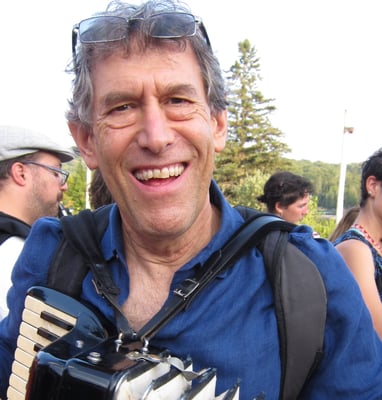Much like the writing process more broadly, many elements come together to make a great song: your life experiences, the songs you grew up listening to, and all your hard work writing on WtW, will all inform the lyrics you compose. For our Songwriting Competition, we enlisted the help of multi-instrumentalist and composer Hankus Netsky to get even closer to the beat of what makes a good song. In his advice to the WtW community, Netsky reflects on the importance of building a repertoire of your favorite songs to help guide your own songwriting style, and offers some useful tips for beginner writing and recording.

For some of our young writers, songwriting is a completely new genre to them. How would you suggest a novice songwriter tackle this challenge?
The first step for a songwriter is to have a repertoire of songs by songwriters they love and know those songs inside out. These models might be all over the map stylistically (for example, Joni Mitchell, Charles Ives, Samuel Barber, Stevie Wonder, Thom York, Amy Winehouse, Irving Berlin, Carole King, Woody Guthrie), but it’s impossible for a songwriter to be successful without models. And, if they can’t figure out the songs they love, they will also need to work on musical skills before getting started—–and they will also want to have a notebook (paper or virtual) so that, whenever they have an idea for a song they can write it down—–or sing it into their phones!
As a multi-instrumentalist and composer, tell us about your own songwriting process?
I don’t use any instrument to compose. For me, it’s got to come from singing. I like to start with a phrase that might become the chorus and I turn it around in my head until I find a way to use it that strikes me as both catchy and original. A lot of the times, that has to do with finding the most important word in the phrase and figuring out the perfect amount of silence to use after that word. Good examples of this might be the James Taylor song, “Fire and Rain”, the Bob Dylan song, “Knock, Knock, Knockin’ on Heaven’s Door”, the Gershwin brothers song, "The Man I Love” or the song “River” by Joni Mitchell, but those are just the first four that come to my mind…any good song does that!
Some writers will choose to record their song. Do you have any useful tips for the recording process?
I don’t think it has to be very complicated. Getting into too much production at an early stage can make you think your song is a lot better than it really is; that’s really for your live audience to decide. For the first recording, I’d suggest using your phone! If someone else likes your song, then it’s okay to start getting fancier but, until someone else is paying the bill, I definitely wouldn’t go beyond what you can easily do on Garage Band or the equivalent.
What are you looking for in a winning entry?
I’ll be looking for a song that has a strong central idea, both lyrically and musically, from a songwriter who has a firm grasp of the basic principles of melody and harmony.
Who are your favorite songwriters?
I look to different people for different aspects of songwriting. Jimmy Van Heusen really raised the bar on harmony, enlarging on what Gershwin and Irving Berlin and, of course, Brahams and Debussy had already put out there. I love Paul Simon’s way of “re-composing” music from all kinds of sources. Joni Mitchell brings in so many elements (especially from her jazz background) and really knows how to get a personal story out there. Leonard Cohen and Bob Dylan are the ultimate poet/songwriters, and John Prine just tells it like it is in plain English. Randy Newman is as clever as it gets, and I also love his arrangements. And there’s nothing else like the best of Philly Soul from the seventies, especially the work of Thom Bell and Linda Creed, which is really a wonderful way to combine the work of Burt Bacharach and Hal David with the best of Smokey Robinson. There are also great ethnic songwriters, like Joseph Rumshinsky and Ilya Trilling who wrote for the Yiddish Theatre. And James Brown really knew how to turn a sermon into a song.




